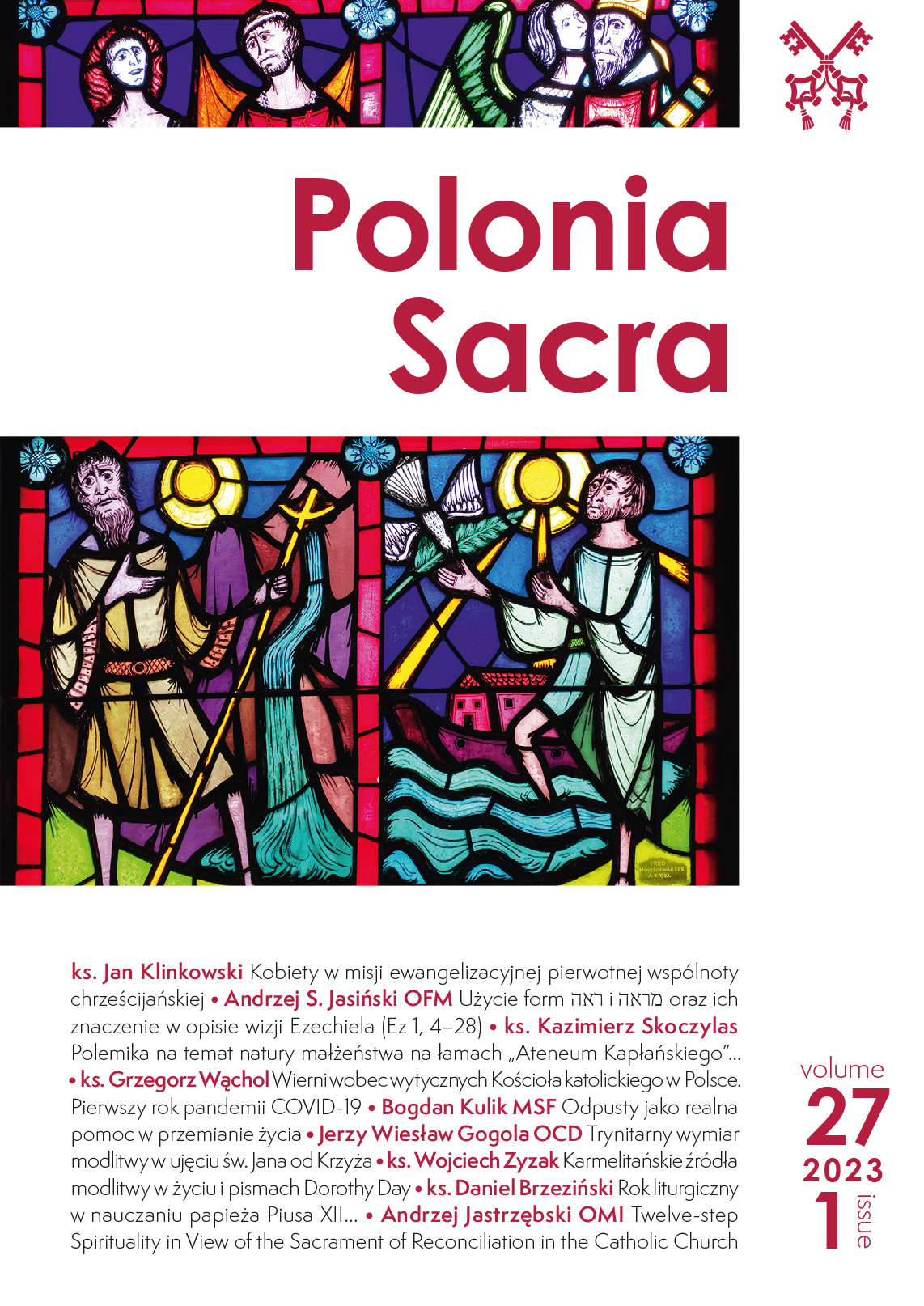Trynitarny wymiar modlitwy w ujęciu św. Jana od Krzyża
DOI:
https://doi.org/10.15633/ps.27106Słowa kluczowe:
modlitwa, Trójca Przenajświętsza, Boże dziecięctwo, dialogAbstrakt
W artykule podjęto problem relacji modlitwy wierzącego do Osób Trójcy Przenajświętszej, opierając się na pismach św. Jana od Krzyża (1542–1591), karmelitańskiego mistyka i doktora Kościoła. Refleksja zawiera dwa powiązane ze sobą zagadnienia: podstawa modlitwy trynitarnej oraz jej praktyka, inaczej mówiąc być i działać wierzącego. Praktyka modlitwy opiera się na świadomym włączeniu się wierzącego w trynitarny dialog: do Ojca przez Chrystusa w Duchu Świętym. Zastosowano metodę analizy źródeł teologicznych i pism św. Jana od Krzyża, uwzględniając strukturę artykułu, by móc uzyskać odpowiedź na postawiony na początku problem badawczy. Wnioski: Źródłem modlitwy jest nasze synostwo Boże w Chrystusie i związane z nim uzdolnienie do nadprzyrodzonej komunikacji z Bogiem oraz misterium zamieszkania Trójcy Świętej w duszy. Bez obiektywnej obecności Boga w życiu człowieka i bez jego zdolności do dialogu z Nim, modlitwa nie byłaby absolutnie możliwa. Modlitewny dialog realizuje Duch Święty. Naszym zadaniem jest pozostać zjednoczeni z Chrystusem i w Nim dawać się prowadzić Duchowi Świętemu. Jakość modlitwy zależeć będzie od stopnia poznania Boga i siebie oraz od jakości miłości, którą wierzący może rozwijać pełniąc wolę Bożą, zależną od rodzaju otrzymanego powołania. O ile uzdolnienie do modlitwy jest oczywistością katechizmową, to logikę praktyki trynitarnej modlitwy najlepiej uchwycić, analizując mistyczne zjednoczenie wierzącego z Bogiem. Na jego podstawie można zaobserwować absolutne pierwszeństwo działania Ducha Świętego w całym życiu duchowym wierzącego, któremu przyda rola otwartości na Jego działanie i współpracy.
Bibliografia
Azevedo. M., La preghiera nella vita. Sfida e dono, Milano 1989.
Crisógono de Jesús Sacramentado, Vida y obras de San Juan de la Cruz, Madrid 1978.
Foley M., Noc ciemna. Doświadczenie psychiczne i rzeczywistość duchowa, przekł. M. Filipczuk, Kraków 2020.
Gabrielle di S. M. Maddalena, San Giovanni della Croce dottore dell’amore divino, Firenze [1943].
Gogola J. W., Od Objawienia do zjednoczenia. Synteza teologii modlitwy, Kraków 2008.
Gogola J. W., Święty Jan od Krzyża dzisiaj. Doktryna sanjuanistyczna w świetle współczesnej duchowości, Kraków 2018.
Gogola J. W., Teologia komunii z Bogiem. Synteza teologii duchowości, Kraków 2003.
Misztal W., Odnowienie i udzielenie pełni życia w Świętym Duchu Ojca i Chrystusa, Kraków 2002.
Rodriguez J. V., Święty Jan od Krzyża. Biografia, tłum. D. Wandzioch, E. Strach, Poznań 2019.
Ruiz Salvador F., Mistico y maestro san Juan de la Cruz, Madrid 1986.
Ruiz Salvador F., Święty Jan od Krzyża. Pisarz, pisma, nauka, tłum. J. E. Bielecki OCD, Kraków 1998.
Stein E., Wiedza krzyża. Studium o św. Janie od Krzyża, tłum. I. J. Adamska OCD, Kraków 1999.
Stinissen W., Noc jest mi światłem, przekł. J. Iwaszkiewicz, Kraków 1993.
Święty Jan od Krzyża, Doktor Kościoła, Dzieła, z hiszp. przeł. B. Smyrak, Kraków 2010.
Pobrania
Opublikowane
Numer
Dział
Licencja

Utwór dostępny jest na licencji Creative Commons Uznanie autorstwa 4.0 Międzynarodowe.
Autorzy publikujący w czasopiśmie udzielają jego wydawcy zgody o następującej treści:
- Autor zachowuje autorskie prawa majątkowe do utworu, a jednocześnie udziela wydawcy czasopisma zgody na jego pierwszą publikację w wersji drukowanej i wersji online na licencji Creative Commons Uznanie autorstwa 4.0 Międzynarodowe oraz zgody na wykonywanie opracowań, w tym przekładów.
- Autor ma możliwość udzielania zgody niewyłącznej na opublikowanie utworu w wersji, która ukazała się w czasopiśmie (np. zamieszczenia go w repozytorium instytucjonalnym lub opublikowania w książce), wraz z informacją o jego pierwszej publikacji w czasopiśmie.
- Autor może umieścić swój utwór online (np. w repozytorium instytucjonalnym lub na swojej stronie internetowej) jeszcze przed zgłoszeniem utworu do czasopisma.

